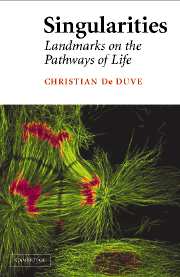Book contents
- Frontmatter
- Contents
- Foreword
- On Christian de Duve: An Editor's Appreciation
- General Introduction
- 1 Building Blocks
- 2 Homochirality
- 3 Protometabolism
- 4 ATP
- 5 Electrons and Protons
- 6 Thioesters
- 7 RNA
- 8 Proteins
- 9 DNA
- 10 Membranes
- 11 Protonmotive Force
- 12 Protometabolism Revisited
- 13 The LUCA
- 14 The First Fork
- 15 Eukaryotes
- 16 Oxygen
- 17 Endosymbionts
- 18 Multicellulars
- 19 Homo
- 20 Evolution
- Final Comments
- Bibliography
- Index
3 - Protometabolism
Published online by Cambridge University Press: 18 January 2010
- Frontmatter
- Contents
- Foreword
- On Christian de Duve: An Editor's Appreciation
- General Introduction
- 1 Building Blocks
- 2 Homochirality
- 3 Protometabolism
- 4 ATP
- 5 Electrons and Protons
- 6 Thioesters
- 7 RNA
- 8 Proteins
- 9 DNA
- 10 Membranes
- 11 Protonmotive Force
- 12 Protometabolism Revisited
- 13 The LUCA
- 14 The First Fork
- 15 Eukaryotes
- 16 Oxygen
- 17 Endosymbionts
- 18 Multicellulars
- 19 Homo
- 20 Evolution
- Final Comments
- Bibliography
- Index
Summary
Given a steady supply of organic building blocks, whether delivered from outer space or formed locally, what goes on next depends on prevailing physical and chemical conditions, as exemplified by Earth, Europa, Titan, and, perhaps, Mars, which all have undergone different histories while probably all receiving the same array of cosmic building blocks. Under the conditions that existed on Earth some four billion years ago – assuming life arose on our planet – the building blocks entered into a complex set of chemical interactions that initiated a long road that finally was to lead to the first primitive living cells. These early chemical processes are generally referred to as prebiotic, or abiotic, chemistry. They will be designated protometabolism in this book, in order to indicate that they preceded present-day metabolism and gave rise to it.
The pathways of protometabolism are unknown, but they can be approached, theoretically and experimentally, with the help of what is known of present-day life. There are good reasons to believe, for example, that RNA was the first bearer of replicable genetic information, only later to be followed and replaced by DNA. It is also highly probable that proteins were originally assembled from amino acids by interacting RNA molecules, which eventually gave rise to the components of the protein-synthesizing machinery. These notions, which have inspired Gilbert's RNA-world model (Gilbert, 1986), will be examined in greater detail later.
- Type
- Chapter
- Information
- SingularitiesLandmarks on the Pathways of Life, pp. 15 - 24Publisher: Cambridge University PressPrint publication year: 2005



